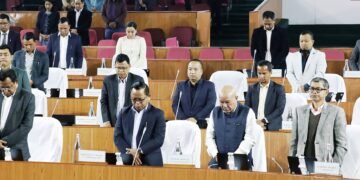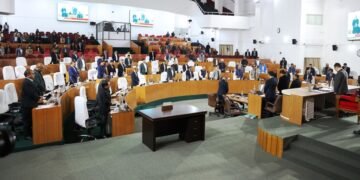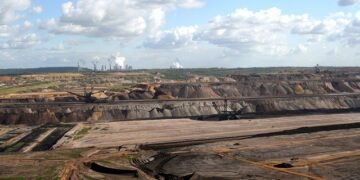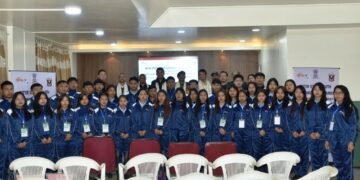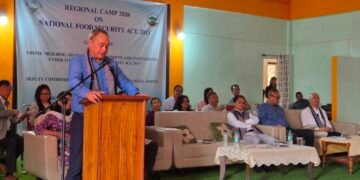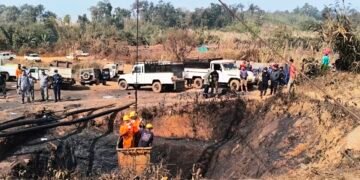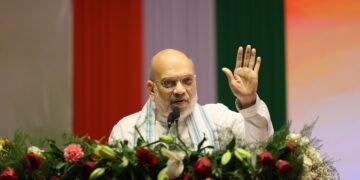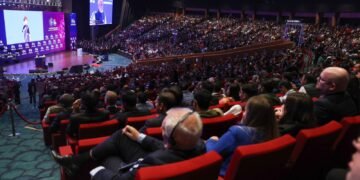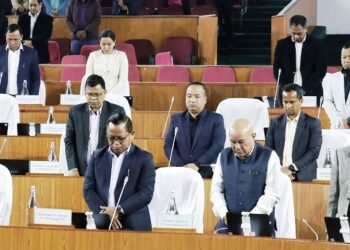Just as there is the building up to the breaking down, the two must always function simultaneously in life, yet nowhere will anyone find anything that affirms this generally accepted truth. Why? Because it is not a truth, there is no necessity in breaking down, there is only building up; everyone everywhere is busy building up for self or for those around him with the benevolence of a single task in mind…to do that which is good for self and the community. It is easy to segregate the building up and the breaking down with the usual myopia into that which is useful and harmful, good and evil, but on the broader outlook and when we cautiously introspect on the application and the eventuality of the outcome, we become suspicious of the breaking down and finally abandon it, i.e. we refuse to break down.
That has always been the way of the Khasi-Pnar, and I daresay that it still is the way of the Khasi-Pnar to this day. Anything that promotes the survival and the continuation and the development of the race, even that which is the most harmful such as the acceptance of the non-Khasi-Pnar ways into the Khasi-Pnar way of life may eventually turn out to be the most useful, for it nurtures in itself or in the things it influences through its effects, instincts without which the race would have long become feeble or rotten. Do you see how this works? If only the superficial meaning of what we have long believed that we must isolate ourselves from the influence of other societies had any truth and relevance we would have long decayed and along with us our values and culture.
But no we didn’t allow that to happen we innovated we created we simplified the systems that made life possible for ourselves as a society, by adopting that which foreign cultures brought like religion, language, customs and cultures, adapting our “Dorbar System” to democracy yet never losing ourselves in the process, never allowing ourselves to be overwhelmed by the influences of these new systems instead keeping these contending masses of ideas and innovations simple so that they rhythmically found a place and meaning in our ways instead of bewildering and confusing us In short they gelled in with our customs and our surroundings and we never lost ourselves in the process. We did so because what we did brought about a blessing in our personal lives and in the lives of those we lived with, whether as providers or dependants, essentially to the benefit of our own selves and everyone involved in our lives.
However there is the other story to it all which may just be the opposite of what is stated above in the long run – our comfort which we have created for ourselves may just be the cause that will bring about the end of our Khasi-Pnar ways…at least of life as we know it, because that is what our ancestors would say if they were ever to be placed in the midst of what we have now…they would exclaim like we would 50 years from now, “life has been broken down,” when the truth would actually be “life has been built up.” Yes, we are building up, we have accepted technology and with it we can see it building things that we never imagined in our wildest dreams and we have blindly accepted it, we just don’t want to admit that the things we treasured most at one time are vanishing just as rapidly as the new are coming in. It could just be a curse disguised as a blessing or the other way round.
We did not have to deconstruct that which was written in our “Ktien Sneng,” our “Words of Wisdom,” instead we made possible the construction of the new without breaking down the old – let the old remain intact as the cornerstone upon which everything new is built up, let it be there for the interest it arouses but we, let us never forget our roots; we must go on inventing and constructing and adopting new ways to open the vast fields of possibilities as the well-known paraphrase of a line by Dostoyevsky which implies that if God does not exist, everything is permitted, everything is possible: “if there’s no God then everything is as I will it to be, and I’m bound to express my will,” or if God has left this to me can I impose my free will on everything that is around me? This was once the way of life with every society, even the Khasi-Pnar society. It was from this way of life that we have moved on, in some aspects 100 per cent and others in varying percentages.
Why are we so eager to replace our old values with the new, if not all at least quite a number of them? That is a question we must ask ourselves and that is a question we must answer because in answering that question we will discover the reality of who we really are, the kind of person we are deep within, not the one that reveals itself to the public, not the one that is used to impress others and raise our standing in society, not the one that finds comfort and satisfaction in being who we want people to see us as so that the danger that others might be to us is turned into admiration and thus we become freed from having to cope with danger and the reality of that weakness that is inherently predominant in us as human beings.
Yes, we use technology, we develop technological advancements to shield us from who we really are but that cannot be deemed by any stretch of the imagination that we have broken down that fearful nature that resides in us as tribals For hundreds of years now technology has rapidly advanced our lives and brought about the kind of change that we now consider as advancement, progress and development in our social life but the real nature of life is what we are within ourselves and that is not affected by the progress and advancements of technology. There is something else that is required if we really want to change who we truly are. Technology and the advancement that it brings along with it are essentially for our comfort and protection and the truth of the matter is that these external factors are meaningless in the true reason for our existence.
In the modern age, though, we are so comfortable that we’ve become completely vulnerable; our security has made us soft. This is not about being physically tough, it’s about being mentally tough! This toughness I’m referring to is related to what psychoanalysts see more clearly: that danger, and the possibility of suffering, is part of what adds meaning to life, because they create the possibility of triumph. It is therefore right that we ask ourselves, “Has danger and suffering made us better?” The obvious answer to this basic question is. “No, they have not.” There may be many reasons that we would like to attribute to why this is so.
I am rather hesitant to state what I think is the reason, but it must be stated. A person who has only a little time every day for his own principal affairs, and has to spend almost all his time and strength on duties which others can do as well as he can, but won’t, such a person is not harmonious; he is at odds with himself and eventually he becomes a victim of his own thoughts and interpretations. If I had any influence on the younger generation, it has long since melted into thin air – my writings least interest them, in fact writings least interest most people these days.
Moments when I write are now stolen moments, the interim seized by aging, and between religion and the thoughts that pressure groups (what were once called Non-Government Organisations (NGOs)) have now become the dominant driving force in whatever is left of our culture. Under certain conditions these pressure groups are a blessing, but with the blossoming of these groups like a “monsoon mushroom” their value is no longer a building block but a builder of mountain blocks where there were none – a fleeting visit into what transpired a few week backs at Umtyngngar provides ample enlightenment on what I’m saying. Not, I admit, that the groups even bother to admit, for they deny that mistakes are mistakes that a madhouse is a madhouse.
On the other hand, the Dorbar Shnongs of the Khasi-Pnar, I must admit, stand in support of all intellectual well constitutedness – they (the Dorbar Shnongs) still use only the ancient original Khasi-Pnar mind in their dealings and decisions. I’m especially referring to the decision of the Dorbar Shnong Mawsynram and the pressure groups that supported the Dorbar in preventing the use, and the likelihood of the use of the “Mawjingbuin” cave for some other purpose. It is a tourist attraction and for us it is a speculative relic – I’m not aware if there is any specific legend behind the stalagmites and the stalactites in that cave – perhaps someone – someone of the priestly clan most likely – the kind that lack psychological cleanliness and possessed instead of an unhealthy spirit will come out with a legend to establish the how and why of that cave – and we will oppose it with all our might. Religious interpretation of a natural phenomenon is for the decadent – faith means not wanting to know what is true, and we must not let anyone come with their faith to deny the Dorbar Shnong of its rightful place in protecting and earning from that place. In the modern age, this religious sentiment is unspeakable…that is the only truth.

